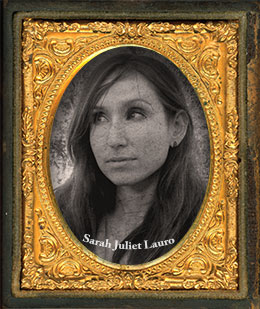Volume 32 · Number 2· Spring 2015
Still Alive: A Ph.D. in zombies
While tales of horrific creatures lure undergraduates into literature classes, a romantic literary masterpiece led alumna Sarah Juliet Lauro to the walking dead.

(Bill Buchanan/UC Davis)
Lauro, Ph.D. ’11, was studying Charlotte Brontë’s Jane Eyre for a UC Davis graduate course in English when a thought struck her — the madwoman locked in the attic was a zombie.
Encouraged by visiting professor Tricia Lootens to explore the theme, Lauro wrote a paper about the mad wife Bertha Mason’s Creole heritage and childhood in the Caribbean, Haitian voodoo and the zombie’s roots in African soul-capture myths.
Lauro had grown up in Africa — first on the west coast, where her father helped set up AIDS clinics, and later in Morocco, where she attended high school. So she was familiar with African mythology.
But zombies had never captured her imagination before. “I wasn’t a big horror film fan,” she said.
After that class, she said, she began seeing zombies everywhere. They ultimately became the subject of her dissertation and two books: Better Off Dead: The Evolution of the Zombie as Post-Human, co-edited with Deborah Christie; and The Transatlantic Zombie: Slavery, Rebellion, and Living Death, which grew out of her thesis and will be released by Rutgers University Press this summer.
Lauro, a visiting faculty member at South Carolina’s Clemson University, regularly gets interview requests from journalists writing about the omnipresence of zombies — who have invaded not only cinema but also television, video games, performance art, social protests, pub crawls and 5K fun runs.
Why are the undead everywhere? The zombie, a relatively modern monster, represents our worst fears, Lauro said. “It’s a convenient bogeyman that can be symbolic of whatever we’re worried about.”
She explained how the zombie, fundamentally an allegory of slavery and slave rebellion, has evolved rapidly since the early 20th century when the U.S. occupied Haiti, and Marines came home with voodoo tales of dead men working in cane fields.
In pulp fiction, radio and films, the zombie gained new powers — cannibalistic and contagious — as it morphed over the decades to represent the latest perceived threat to humanity: the Cold War, viral pandemics, economic meltdown, climate change, capitalist greed and alienation.
The zombie myth, like other literature, is a study of the human psyche, Lauro said. “That’s why I teach literature. That’s what I want to explore: Who are we as a people? Where have we been? And we are we going?”
Lauro, for one, is going to Florida. She’ll join the University of Tampa’s English department in the fall and be closer to Haiti for research trips. “I have a couple more zombie projects that I want to do.”
